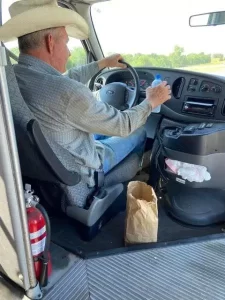Above: A group of campers and leaders from Caney, First, attended Falls Creek youth camp. Pastor Jeremy Parham is on the second row, far right.
CANEY (BP)—Car issues always seem to happen at the worst possible time, and that was exactly the case Monday morning for a group of students from Caney, First.
Jeremy Parham, pastor at Caney, First, said he received a call from one of his deacons Monday morning, July 4, telling him someone had stolen the catalytic converter from both of the church’s vans.
This was just a few hours before Parham and a group of more than 40 students were supposed to be leaving for youth camp at Falls Creek Baptist Conference Center.
Rental options are limited in Caney, and the vehicles of the parents did not have enough combined seats to transport the more than 40 kids.
This situation Caney, First found itself in has become more and more common. A 2021 report from the National Insurance Crime Bureau (NICB) says thefts of catalytic converters have skyrocketed since the start of the COVID-19 pandemic in early 2020.
A catalytic converter is part of a vehicle’s exhaust system. Its function is to convert hazardous chemicals emitted by the engine into less-toxic gas. Thieves target them because of the precious metals they contain. They can be sold on the black market for hundreds of dollars.
The NICB reports in 2019 there was an average of 282 catalytic converter thefts per month. That number rose to 1,203 in 2020 and continues to rise, according to various reports.
The Oklahoman reported the state has recently become a hotspot for the thefts, experiencing a 44 percent increase this year when compared to the first four months of 2021.
In the process of this report, Baptist Press spoke with several Southern Baptist pastors (three in Texas and one in Alabama) who confirmed their churches had a catalytic converter stolen from one or more of their vehicles in the last couple of years.
Replacing a stolen catalytic converter can sometimes take months due to supply chain issue and often ends up costing upwards of $1,000. Insurance will sometimes, but not always, cover a replacement part. Driving without a converter is illegal in some states.
Thefts are becoming so common that Congress is attempting to create legislation aimed at tackling the problem. Legislators introduced the “Preventing Auto Recycling Theft Act” in January.
The law would do several things such as “require new vehicles stamp VIN numbers on catalytic converters, codify federal penalties for stealing the part and require record-keeping for those who are buying and selling converters,” NBC News reported.
The legislation, which included a bipartisan group of co-sponsors, was sent to two committees after its introduction. Sponsors are hopeful the bill will make it to the House floor.
The NICP says steps to prevent thefts include parking vehicles in a secure, locked or alarmed location and installing an anti-theft device that would make cutting out the part more difficult.
Another step is marking the converter with a specific identification number that can be traced back to vehicle it came from.
Various media outlets report some police departments around the country have begun hosting events for citizens to bring their vehicles in for the converters to be marked for free in hopes of cutting down on the rash of thefts.
When it happened at Caney, First, Parham didn’t know how he was going to get his kids to camp. He called his friend Luke Howard at nearby Caddo, Voca. Within a short time, Howard had brought two of Voca’s vans and helped transport Parham and the rest of the group to Falls Creek.
The group wasn’t even late. They arrived around the time they were originally planning to.
Parham told Baptist Press this act of kindness reflected the “tight-knit,” relationship of the churches in the Atoka-Coal Association.
“Luke was in the middle of doing something, and he stopped what he was doing to help us out,” Parham said. “He just exhibited the Christian idea of serving and loving one another so well in that moment. It was a huge blessing for us.”
Parham said it exemplified the camaraderie he experiences regularly in Baptist life.
“We were pretty desperate, and I couldn’t believe how quickly he responded,” he said. “If we ever get a phone call from them where they need our help, I hope we are willing and able to do that.
“I find that both my local association and the SBC (Southern Baptist Convention) as a whole have a real spirit of helping one another out. I feel very thankful that I don’t feel like I’m on my own in my ministry.”





